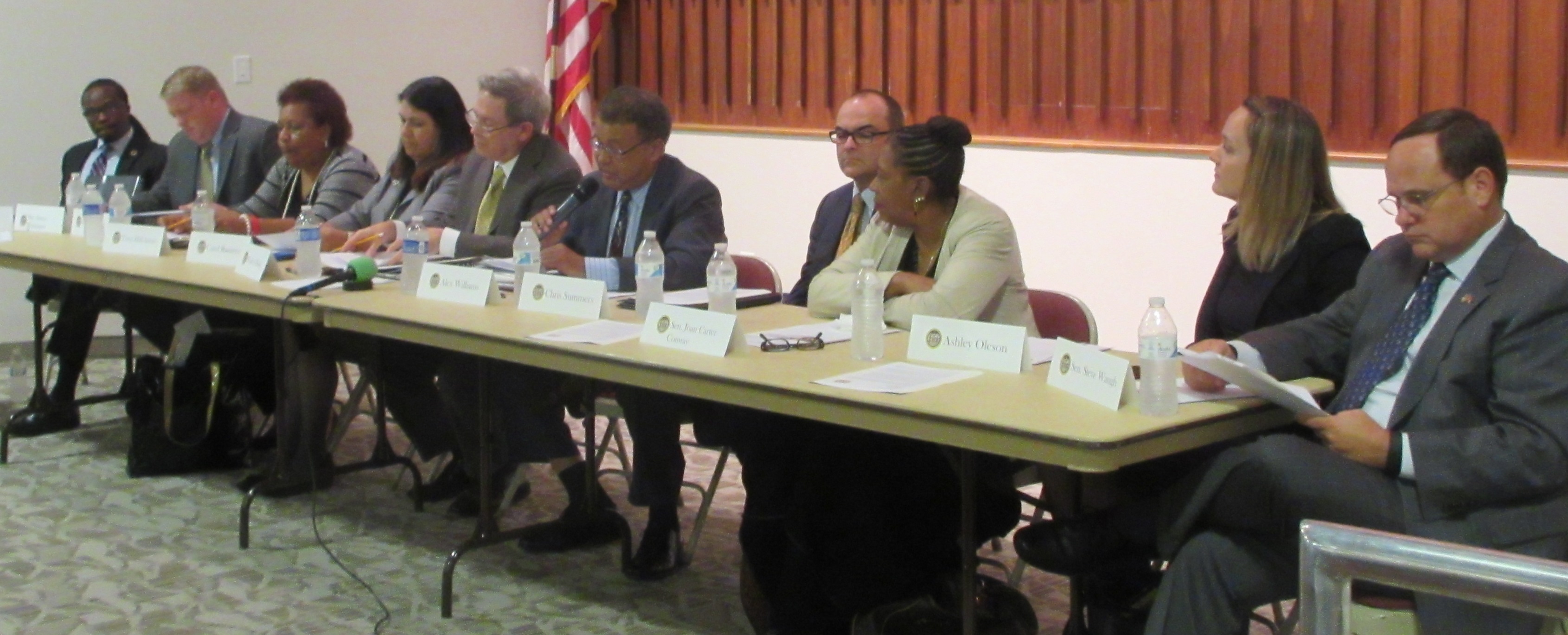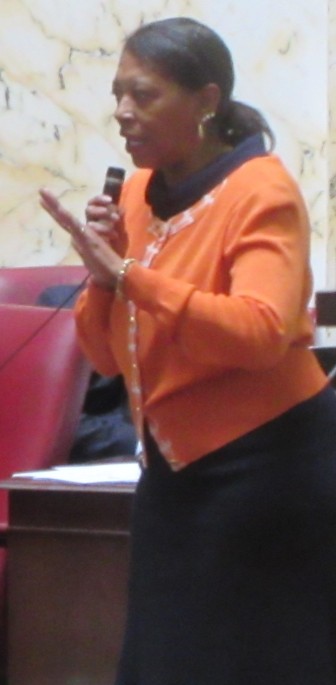By Len Lazarick
While her colleagues debated how they might come up with an independent nonpartisan redistricting commission — as the governor instructed them to do — the highest ranking legislator among them urged them to propose something lawmakers might actually pass: Rational standards for compact and contiguous congressional districts.
“Don’t you want to come out of this with something?” asked Sen. Joan Carter Conway, a Baltimore Democrat who chairs the Senate committee that would likely handle any legislation the commission might recommend. “We want something that works.”
The 11-member Maryland Redistricting Reform Commission was holding its first work session following a series of five regional hearings around the state.
Conway said they didn’t hear enough from younger voters or minorities at these hearings. But one issue on which there was general agreement was the need to write guidelines for congressional districts similar to those that apply to legislative districts.
Similar standards for legislature, Congress
Maryland’s constitution says General Assembly districts should have adjoining territory, be compact in form, and give due regard to natural boundaries and the boundaries of political subdivisions. With no standards like that, Maryland’s congressional districts have become grotesque configurations in a state already oddly shaped, giving it some of the most gerrymandered districts in the country.
“You need to do something with that,” Conway said. “We have standards” for legislative districts. “Congressional districting doesn’t.”
“We can at least fix that,” she said. “I think it would probably be a fight [in the legislature], but I think it could pass,” probably without the constitutional amendment that a new independent commission would require. “You’re never gonna get [that].”
Reform needed
Commission co-chair Alexander Williams, a retired federal judge who has ruled on redistricting appeals, said, “it may be dead on arrival,” but he wanted the commission members to propose how they might compose and empower an independent, nonpartisan commission.
The governor asked the commission for a report by Nov. 3, but there’s some doubt they can meet that goal. They will discuss recommendations next Tuesday, and hope to finalize a report Nov. 3.
“Pretty much everyone agrees that there ought to be some reform,” Williams said. Most witnesses saw “the need for some kind of independent commission.”
But Williams was disappointed “we just didn’t hear from elected officials that supported the system as is.”
That included no testimony from Senate President Mike Miller, a key architect of redistricting plans after the last three federal censuses, who predicted that any change the commission recommended would go nowhere.
No national solution
Commission member Michael Goff, president of the Northeast-Midwest Institute, noted there were recommendations that they hold off Maryland fixing congressional redistricting until there was a national solution for the gerrymandering in Republican-controlled states.
But Goff said, “It is a state responsibility, not a national responsibility,”
“Congress is not going to solve this problem,” Goff said. “If Congress ever tried to solve this, it would be much worse than what we have.”
Many witnesses also advocated for single-member delegate districts, not the combination of one-, two- and three-member districts Maryland now has. Some commission members agreed with that and also favor that the independent commission handle legislative districting as well.
But Conway predicted neither proposal could pass the legislature.
Despite her warning, commission member Christopher Summers, president of the Maryland Public Policy Institute, said, “There is a larger need for definite reform…. We have such a unique opportunity here to do something very bold.”
Witnesses not diverse
Conway was not the only commission member who felt the hearings in Towson, Hagerstown, Waldorf, Easton and Laurel were not representative of Maryland.
The meetings were attended by less than 300 people total, with about 90 people testifying.
Del. Alonzo Washington, D-Prince George’s, noted there was no hearing in Montgomery County, and “we didn’t hear issues of people in urban communities.”
“It was mostly white Republicans who came out to these meetings,” said Washington, who also complained, “We’re being rushed.”
“We should have had a lot more diversity,” said Tess Hill-Ashton, president of the Baltimore City NAACP. But she also favors an independent commission.
“I would like to have seen more representation of people like me,” said Carol Ramirez of Bethesda, but agreed that “I think the process is broken, the process is abused.”





To post a comment you must leave a legitimate email address, even if you’re posting anonymously
Mike Miller already said the fix is in so what’s the purpose? We just have to wait him out. JCC is not going to suddenly upstage Miller and she said as much here.
Too bad many of those who were complicit in the creation of MD’s redistricting map aren’t interested in giving MD voters a fair shake. It shows where their true interests lie, remaining in power is the ultimate goal no matter how one achieves it.
“Senate President Mike Miller, a key architect of redistricting plans after the last three federal censuses, who predicted that any change the commission recommended would go nowhere.”
In other words, he will stop it. Just like he stopped the redistricting question on the ballot by his good friend Linda Lamone writing the question to sound as if people supported the decennial census methodology. Such horse manure.